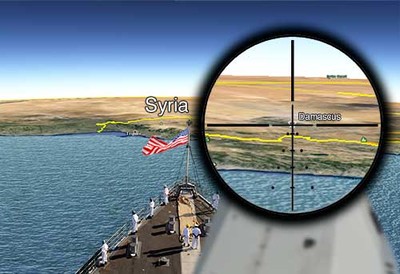 At the time of this writing, the United States appears to be making final preparations for a military strike on Syria in response to a chemical massacre perpetrated by the Assad regime against hundreds of civilians living in rebel-held suburbs of Damascus.
At the time of this writing, the United States appears to be making final preparations for a military strike on Syria in response to a chemical massacre perpetrated by the Assad regime against hundreds of civilians living in rebel-held suburbs of Damascus.
U.S.-led military action in Syria would represent a shift in the willingness by the Washington-led bloc of the international community to confront Bashar al-Assad's regime, though the planned strikes are highly unlikely to topple it.
Instead, it is reasonable to expect a painful slap to the regime, to serve as a punishment and a deterrent against future use of weapons of mass destruction.
A failure by the international community to respond to last week's atrocities would be interpreted by the Iran-led Shi'ite axis – of which Syria is a central part – as a green light for further WMD attacks.
That would be a highly dangerous development, due to the increasingly radical and erratic actions of Syria, and its willingness to use unconventional weapons.
Furthermore, Iran, which sees Syria as a strategic forward province, is helping to orchestrate Assad's war, and would be encouraged by Western inaction to continue sponsoring and arming terrorists all over the Middle East, while developing its nuclear program.
Military action will send an important message of deterrence to Assad's backers in Tehran, as well as to Hizballah in Lebanon, whose fighters have helped keep the Syrian regime alive.
In recent days, Syrian and Iranian officials have issued a series of threats designed to deter a punitive strike, asserting, for example, a U.S. attack will create "a ball of fire that would burn not only Syria but the whole Middle East." One Syrian spokesman claimed Israel would be the "first victim" of a U.S. attack on Syria, and that Israel will "come under fire" in the event of a strike. Such statements have been routinely issued by Iran and Syria in the past.
Although they can't be entirely dismissed, these threats stand little chance of materializing. Any direct Syrian retribution attack on Israel will jeopardize the Assad regime's very existence.
In light of the fact that Assad is likely to survive an American military move, it would make no sense for him to take a step that will all but ensure his demise by provoking an Israeli response.
Nevertheless, in the Middle East, irrational steps can never be ruled out.
Some Israeli defense observers say Assad's willingness to use chemical weapons on the scale of last week's attack is a sign of existential distress.
The rebels have been making gains in the Damascus region, in Allepo, and the northern Allawite region of Latakia, the latter being an area slated to form a Tehran-backed, Hizballah-protected Allawite state in the event of a regime collapse.
According to reports by the Syrian National Opposition Council, the 155th Brigade of the Syrian army's elite Fourth Armored Division – commanded by the notoriously ruthless Maher Assad, brother of the Syrian president – fired dozens of chemical rockets from its base on Mount Qalamoun, north of Damascus.
The rockets exploded in multiple residential areas, resulting in the now notorious video images of children, women, and men dying a slow and painful death, and lined-up corpses in makeshift morgues that lack any apparent physical injury – a telltale sign of a chemical attack.
It was the largest chemical attack in Syria since the civil war broke out in 2011 (and the largest in the world since Saddam Hussein's chemical attack on Kurds in 1988), but by no means the first, according to Israeli intelligence assessments.
Israeli Defense Minister Moshe Ya'alon noted that chemical weapons attacks in Syria have "become a matter of routine," and described Syria as an "unconventional regime using unconventional weapons."
On the other side of the divide, radical al-Qaida-affiliated Sunni organizations are mushrooming in Syria, and are spreading their ideology and reach to other regions such as Lebanon.
The longer the Syrian war drags out, the greater the regional network of radical jihadi organizations, centered in Syria and spreading outwards to neighboring states, will be.
Assad's use of chemical weapons led the al-Qaida linked Jubhat Al-Nusra organization – one of the largest rebel groups in Syria – to vow an escalation in sectarian attacks. Other rebel groups said they would launch raids of Syria's chemical weapons caches in response.
The threat posed to regional and global security by chemical weapons in the hands of al-Qaida would be intolerable.
Radical Sunni groups are not only growing strong in Syria – they've moved into Lebanon, and are engaging the Shi'ite Hizballah in an escalating tit-for-tat war of car bombs and rockets. More than 60 Lebanese have been murdered in sectarian car bombings this month.
The newly established al-Qaida-inspired presence in Lebanon includes a group that fired four rockets at Israel's north last week, prompting an Israeli retaliatory strike in Lebanese territory.
All of these developments point to the growing destabilization of the region, due to the war raging in Syria. The destabilization effect is fuelled further by the use of unconventional weapons.
Just as terrorism and extremism are seeping out of Syria, chemical arms and their use, if left unchecked, can spread beyond Syria's borders and wreak havoc.
Yaakov Lappin is the Jerusalem Post's military and national security affairs correspondent, and author of The Virtual Caliphate (Potomac Books), which proposes that jihadis on the internet have established a virtual Islamist state.



